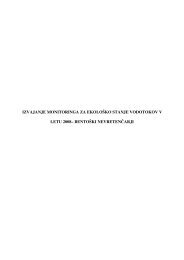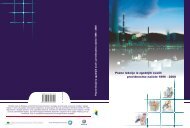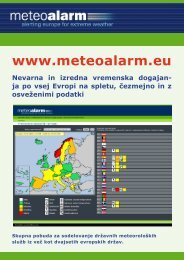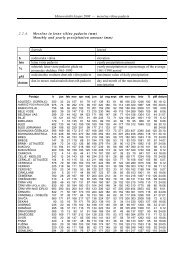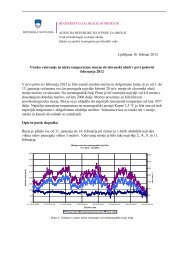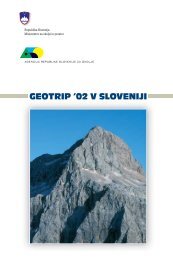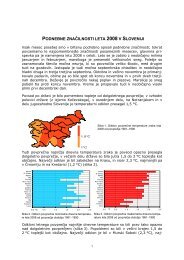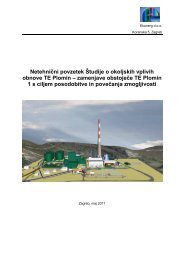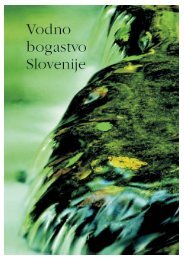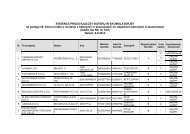Water Quality in Slovenia - Agencija RS za okolje
Water Quality in Slovenia - Agencija RS za okolje
Water Quality in Slovenia - Agencija RS za okolje
You also want an ePaper? Increase the reach of your titles
YUMPU automatically turns print PDFs into web optimized ePapers that Google loves.
4<br />
Guidel<strong>in</strong>es for Future Work -<br />
<strong>Water</strong> <strong>Quality</strong> Assessment <strong>in</strong> Accordance to the<br />
<strong>Water</strong> Framework Directive<br />
<strong>Water</strong> quality monitor<strong>in</strong>g <strong>in</strong> <strong>Slovenia</strong> has a long tradition, but <strong>in</strong> 2007, it was for the first time carried<br />
out entirely <strong>in</strong> accordance with the requirements of the <strong>Water</strong> Framework Directive. The recent<br />
monitor<strong>in</strong>g programmes for water quality are prepared accord<strong>in</strong>g to a new monitor<strong>in</strong>g approach<br />
which is be<strong>in</strong>g <strong>in</strong>troduced by the <strong>Water</strong> Framework Directive. They are based on pressure analyses<br />
- i.e., data on emissions, land use, surpluses of nitrogen and the amounts of pesticides used etc.<br />
Accord<strong>in</strong>g to the analysis of these data, the monitor<strong>in</strong>g programme is problem oriented and <strong>in</strong>volves<br />
predom<strong>in</strong>antly problematic water bodies. Other water bodies are less frequently <strong>in</strong>cluded <strong>in</strong> the<br />
programme.<br />
An essential novelty of the monitor<strong>in</strong>g of the surface water quality is the assessment of the<br />
ecological status. The ecological status is evaluated based on four biological and the support<strong>in</strong>g<br />
physico-chemical and hydromorphological quality elements. The biological quality elements are<br />
phytoplankton, phytobenthos and macrophytes, benthic <strong>in</strong>vertebrate fauna and fish. The evaluation<br />
of the ecological status is determ<strong>in</strong>ed by measur<strong>in</strong>g the alteration of the ecosystem’s structure and<br />
deviation from the natural conditions. The natural or reference condition is a status whereby the<br />
impact of human activity is either not noticeable or is <strong>in</strong>significant. S<strong>in</strong>ce the reference status of water<br />
bodies are different, a type-specific approach is used whereby the waters are classified <strong>in</strong>to different<br />
types accord<strong>in</strong>g to their natural characteristics and then reference conditions are def<strong>in</strong>ed for each<br />
type. For each type, five classes of ecological quality are def<strong>in</strong>ed. As <strong>in</strong> most European countries, the<br />
system of assessment of ecological status is still be<strong>in</strong>g developed <strong>in</strong> <strong>Slovenia</strong>.<br />
Also, one of the requirements of the <strong>Water</strong> Framework Directive is the evaluation of the chemical<br />
status. For the time be<strong>in</strong>g, the chemical status of surface waters is evaluated accord<strong>in</strong>g to the<br />
exist<strong>in</strong>g legislation from 2002. In the European Community, the environmental quality standards<br />
for the determ<strong>in</strong>ation of chemical status are <strong>in</strong> the adoption procedure, but the concentration of<br />
ha<strong>za</strong>rdous substances will have to be monitored, which must gradually disappear from the aquatic<br />
environment. Some of these substances (mercury, cadmium, lead, nickel, atraz<strong>in</strong>e, polycyclic aromatic<br />
hydrocarbons...) were already <strong>in</strong>cluded <strong>in</strong> previous years, and some will have to be added to the<br />
monitor<strong>in</strong>g programme.<br />
In the field of groundwater, the chemical status of those water bodies from which more than 100 m3 of water is pumped daily for the dr<strong>in</strong>k<strong>in</strong>g water supply, should be evaluated. In the case of <strong>Slovenia</strong>,<br />
it means that all of the water bodies will be <strong>in</strong>cluded <strong>in</strong> the monitor<strong>in</strong>g programme. Until 2006,<br />
monitor<strong>in</strong>g was predom<strong>in</strong>antly oriented towards the aquifers with <strong>in</strong>tergranular porosity, where<br />
the problems are the worst, and for the rema<strong>in</strong><strong>in</strong>g types of aquifers, analyses were carried out only<br />
occasionally. Tak<strong>in</strong>g this <strong>in</strong>to account the number of monitor<strong>in</strong>g sites for groundwater <strong>in</strong>creased<br />
substantially <strong>in</strong> 2007. The <strong>Water</strong> Framework Directive allows for water bodies with a good chemical<br />
status not to be monitored every year however the frequency will only be changed after the first<br />
assessment of the chemical status.<br />
For the last eight years, all European countries have been promot<strong>in</strong>g the <strong>Water</strong> Framework Directive,<br />
which was adopted <strong>in</strong> order to preserve and improve the quality of water resources. The aim of the<br />
<strong>Water</strong> Framework Directive is to achieve a good chemical and ecological status of surface waters, as<br />
well as a good chemical status of groundwater by 2015. With the <strong>in</strong>tention of obta<strong>in</strong><strong>in</strong>g a reliable<br />
assessment of water status, the <strong>Water</strong> Framework Directive prescribes monitor<strong>in</strong>g which should be<br />
established by the end of 2006 at the latest. The first comprehensive assessments of the status of<br />
surface waters and groundwater will be laid out for the purpose of the first river bas<strong>in</strong> management<br />
plans by the end of 2009. If countries have water bodies with a bad chemical or ecological status, they<br />
65



